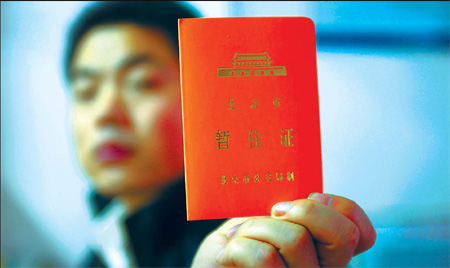Overhaul for Temporary Residency Permit
Adjust font size:
|
|
|
A man shows his temporary residence permit at a police station in Chaoyang District Wednesday. [China Daily] |
Beijing's temporary residency permit will be changed from next year to help the government monitor the city's massive floating population.
Migrants will be required to submit personal information such as current housing and employment details when applying for the residency permits, said the city's floating population management office in a meeting with the city's political advisors Wednesday.
At present, there are more than 8 million temporary residency permit holders in Beijing, which is only a part of the city's floating population.
Under the new system, the permit, which will be called a floating population residency permit, will hold a microchip on which personal data such as name, age and hometown, are stored.
The current permit does not have this information.
Miao Lin, deputy director of the Beijing municipal comprehensive management office, said new floating population residency permit would be promoted throughout the capital next year.
Card holders have to show their permits when they are applying for accommodation in Beijing, applying for jobs, opening businesses, reclaiming medical insurance, paying for children's education, renting houses and buying cars, the official website of the Beijing government reported.
However, experts said the move is far from enough to benefit the city's vast migrant populations.
"The change doesn't solve any hidden problem at all," Shen Mengpei, a member of the Beijing People's Congress, said yesterday.
"The crucial problem of the existing hukou system is that migrants don't have equal rights in a city. Changing the temporary residence permit into the new floating population residency permit certainly cannot remove the discrimination of people's background."
"The resources and space are limited in Beijing, and it is impossible for the city to support everyone who wants to live here," he said.
"The priority for now is to develop the economy in cities around Beijing, in Hebei province and in the Tianjin area, so there will be more opportunities provided for people looking for jobs in Beijing.
And the government should generally cancel the hukou system later on." He believed that would be a way to equalize the floating population with local residents as well as to balance the population resources in the area. Beijing had a population of more than 16 million by the end of last year.
(China Daily December 3, 2009)
